Former public relations executive Adrian Lau Cheuk-yu sees himself as one of a kind as he pounds the streets to secure support in Hong Kong’s upcoming election — a traditional democrat who will push for universal suffrage.
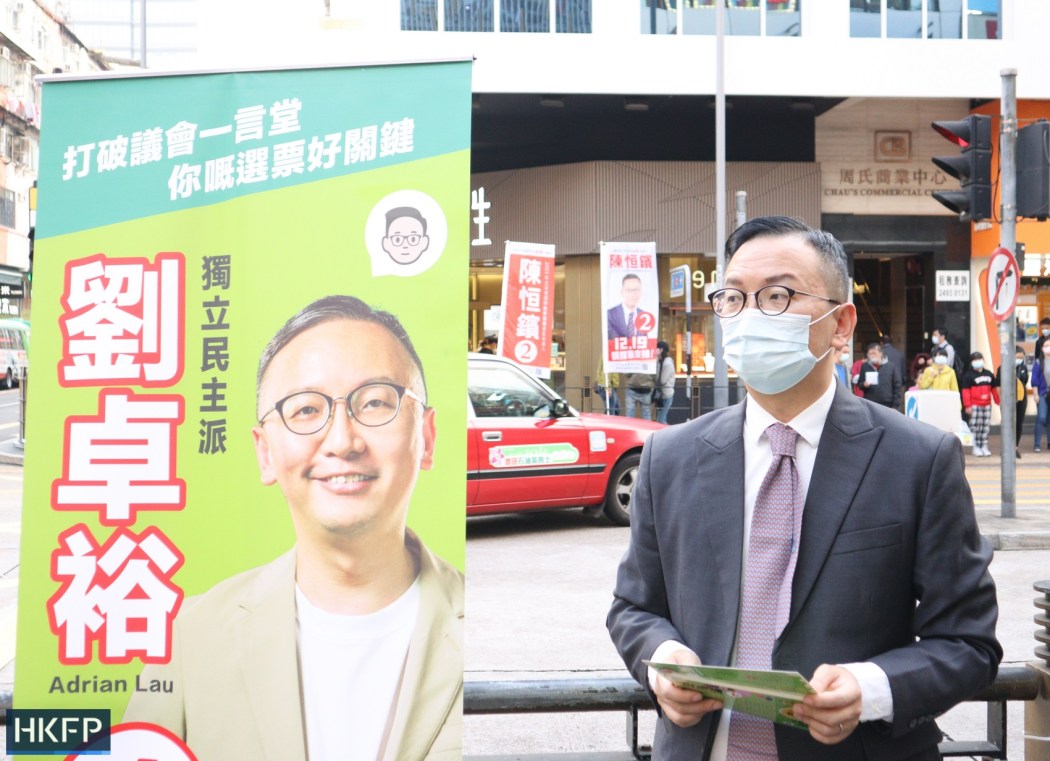
Lau, running in the district New Territories South West, is one of about a dozen candidates in the December 19 Legislative Council (LegCo) race who describe themselves as pro-democracy, at a time when all the familiar faces of veteran pro-democracy politicians are missing from street-side canvassing.
Most prominent democrats are either on remand, already sentenced to jail, in self-imposed exile or resigned from politics for good. Compared to them, Lau is a relatively new face. Yet he is not a political novice – with close to 4,500 votes, the Tsuen Wan native beat Michael Tien, one of Hong Kong’s most popular veteran pro-establishment politicians, in the area’s 2019 district council election.
He was also one of about 60 pro-democracy district councillors who stayed put as scores of others resigned, and whose oath of allegiance to the Basic Law and and the government was approved in October.
While the biggest pro-democracy parties – including the Democratic Party, the Civic Party and the League of Social Democrats – still exist, none of their members have joined the LegCo election after Beijing’s overhaul in March sharply reduced the number of directly-elected geographical constituencies.
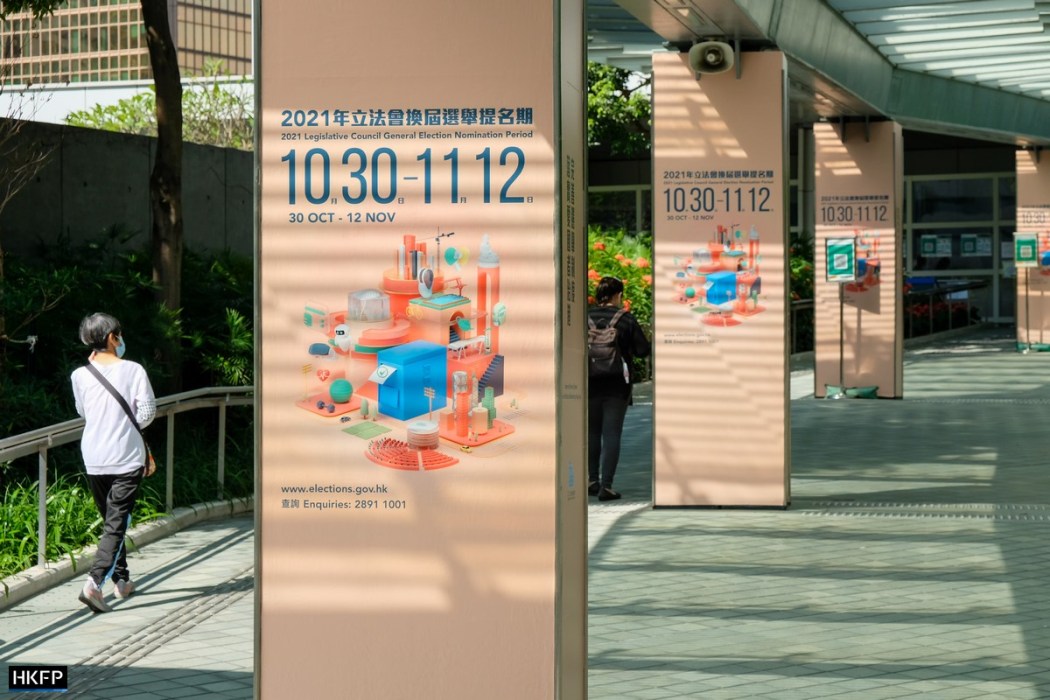
Just three weeks ahead of Hong Kong’s first “all patriots” legislative polls, Lau’s tongue seemed somewhat tied on some of the city’s most pressing issues as he campaigned. When he met HKFP reporters, he sported a dark suit accessorised with a Hermes tie in orange and blue. He instructed a campaign volunteer to blast election slogans from a bullhorn near a busy junction in Tsuen Wan, just a block away from the secondary school he attended.
No democrats, except one?
The former owner of a public relations business had been up canvassing since 7 a.m.
“There are actually no more democrats. Those who joined the election but said they are not pro-establishment are quite far from what ‘democrats’ were,” Lau said, gesturing quote marks.
Lau said he was the exception, vowing to continue his support for universal suffrage: “Supporting universal suffrage for both [the legislature and the chief executive] must be my line. This is what I must say.”
“There are so many red lines, you don’t even know how to talk anymore,” he said. “I think we should simply be like normal people and speak the truth in human language.”
When it comes to supporting legislation to enact Article 23 of the Basic Law, a local national security law that the city is constitutionally required to introduce, Lau was more circumspect.
Article 23 stipulates that the Hong Kong government shall enact laws to prohibit any act of treason, secession, sedition or subversion against the central government. The administration’s previous attempts to do so in 2002 and 2003 sparked a protest with a reported 500,000 turnout, and the resignation of then-secretary for security Regina Ip. The government said it aims to table the bill again within the next legislative term.
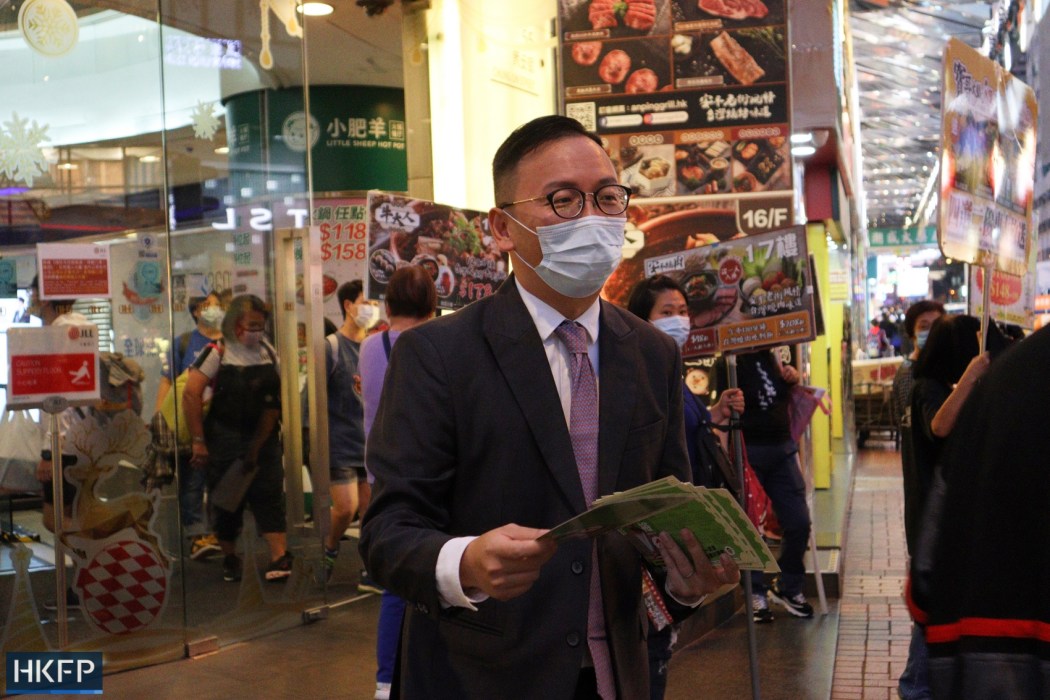
Chief Secretary John Lee said two weeks ago during an interview that anyone who opposed Article 23 would violate their oath to uphold the Basic Law, a requirement for all district and legislative councillors. Councillors unseated as a result of oath violations will lose their right to be elected for five years.
“I can’t say I oppose it so soon. If I said it and I got labelled for it, [they] may want to arrest me and lock me up,” Lau said. “Legislating for Article 23 should only come after universal suffrage. I would not support legislating for Article 23 so long as there is no universal suffrage.”
“Those who understand it, will understand it,” he said, reverting to his favourite expression. “Is this clearer?”
Tough nominations
Under the revamped electoral system’s new rules, there are several hoops to jump through before anyone can become a candidate. Those able to secure the necessary approvals from pro-Beijing figures on the Election Committee are seen by some pro-democracy critics as participants in a manipulated system.
During the early stage of the nomination period, Lau said he texted up to 50 Election Committee members to seek their support but none responded. He then decided to announce publicly that he was seriously considering running – and finally received a call back from a former business contact whom he would only describe as a “tycoon.” The tycoon quickly roped in 10 other pro-Beijing figures to sign his nomination form. Lau said he met each of them to share his honest viewpoints.
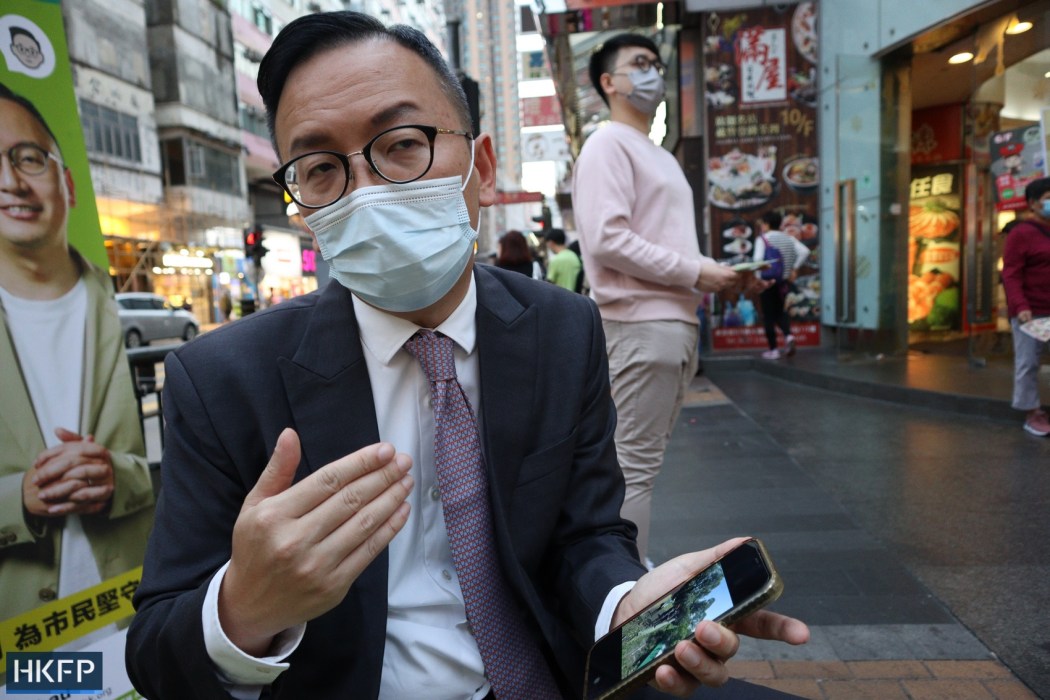
“I didn’t understand what went on behind [the scenes] when I got [these nominations,]” he said, when asked if he believed he had been deliberately placed in an election to create the impression of competition. “I can’t speculate, but I can live up to myself and those who voted for me.”
Lau said he came from the grassroots, growing up in the Kwai Hing public housing estate in Tsuen Wan in the 1980s. He attended a public primary school and after graduating from Lingnan University worked for a Democratic Party politician’s election campaign. A year later he got a job as a publicist in Central, out of a desire to work in the bustling and cosmopolitan business district.
He said he “took airplanes more often than the bus” but finally left behind a successful public relations firm he had founded in order to run for a district council in 2019 as a pro-democracy candidate.
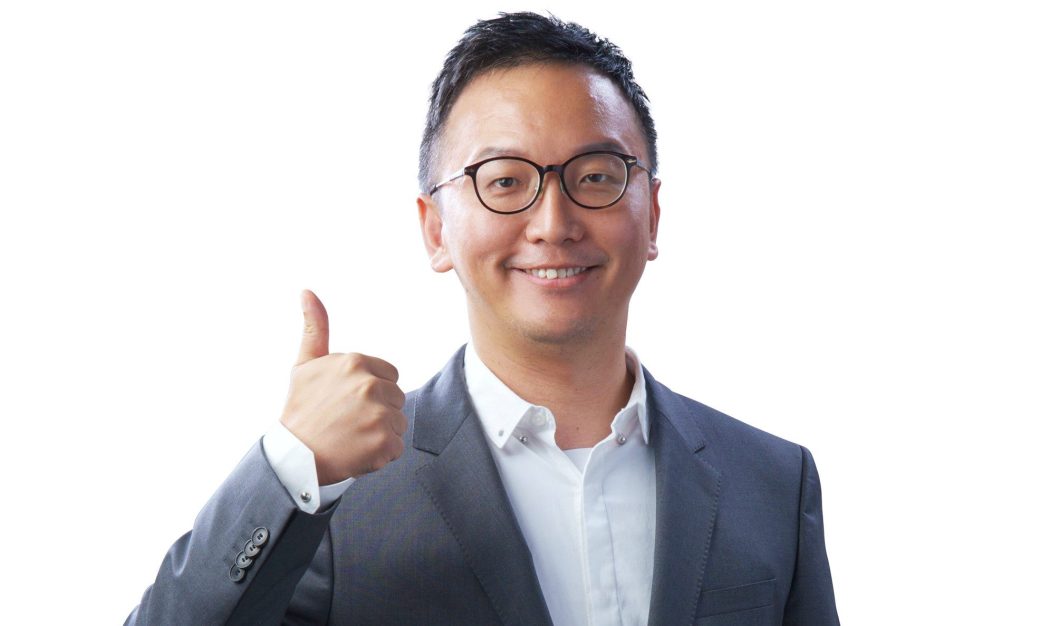
The 2019 polls in the wake of anti-government protests ended with a landslide for the pro-democracy candidates, who won control of 17 out of 18 councils.
In April, rumours began circulating that pro-democracy district council members may have to repay salaries and expenses should they fail to take oaths of allegiance, or if their oaths were deemed insincere. Scores quit as a result. More and more democrats meanwhile ended in jail over past banned protests.
Lau – a single Christian – said that during this period he sought to quell his panic attacks with countless bottles of wine and was immobile on the couch for days. He feared a late-night knock on the door with police come to arrest him. Those feelings only subsided after he committed to two weeks of prayer and fasting.
Months later, Lau was back canvassing on the streets he grew up in. Only this time, with far fewer allies on his side, and perhaps some different ones.
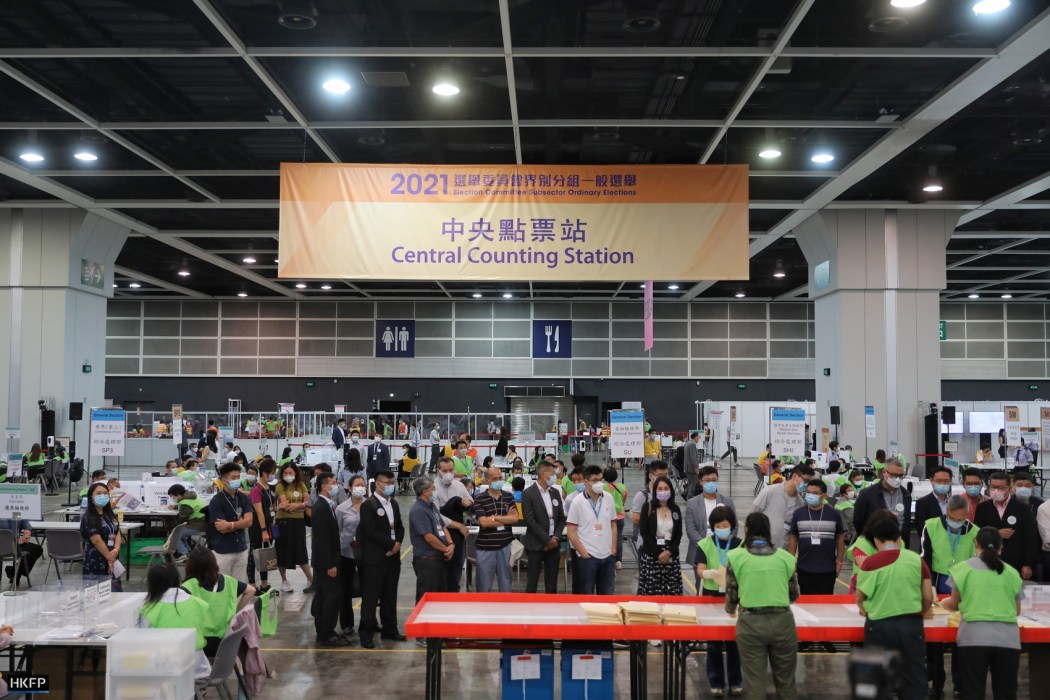
While Lau was able to secure pro-establishment contacts in order to join the race, he remained tight-lipped over who his pro-democracy allies are. Some still support him, he said, “but they don’t dare say it.” He refused to name these supporters, apart from one veteran Democratic Party district councillor, who promised to endorse him in his personal capacity.
He insisted he has not considered the likelihood of winning the polls, but showed HKFP’s reporters a photo of a rubbish bin filled with leaflets for one of his competitors, Ben Chan of the pro-Beijing DAB party. He also urged the reporters to ask passers-by if they had heard of the other pro-establishment candidate, Joephy Chan of the Hong Kong Federation of Trade Unions.
Lau admitted that even if he won his seat, he would have virtually no allies in the next legislature. While self-proclaimed democrats would lack any veto power, Lau believes his lobbying skills as a publicist may come in handy.
“One is much bigger than zero,” he said, referring to the likely lack of opposition voices in the legislature. “I would be one.”
New Territories South West

- Districts included: Kwai Tsing District and Tsuen Wan District
- Projected population as at June 2021: 824,600
- Number of registered voters: 509,991
Candidates:
- Adrian Lau Cheuk-yu: Lau describes himself as an independent democrat.
- Ben Chan Han-pan: Chan represents the pro-Beijing DAB.
- Joephy Chan Wing-yan: Chan represents the pro-Beijing Federation of Trade Unions.
More about Beijing’s election overhaul – click to view
In March, 2021, Beijing passed legislation to ensure “patriots” govern Hong Kong. The move reduced democratic representation in the legislature, tightened control of elections and introduced a pro-Beijing vetting panel to select candidates. The Hong Kong government said the overhaul would ensure the city’s stability and prosperity. But the changes also prompted international condemnation, as it makes it near-impossible for pro-democracy candidates to stand.
Where are Hong Kong’s opposition figures? – click to view
Major pan-democracy groups have not put forward any candidates following the Beijing-led overhaul. Most of the city’s opposition figures remain behind bars, are abroad in self-exile, have quit politics or are barred from running.
Support HKFP | Policies & Ethics | Error/typo? | Contact Us | Newsletter | Transparency & Annual Report | Apps
Help safeguard press freedom & keep HKFP free for all readers by supporting our team

HKFP has an impartial stance, transparent funding, and balanced coverage guided by an Ethics Code and Corrections Policy.
Support press freedom & help us surpass 1,000 monthly Patrons: 100% independent, governed by an ethics code & not-for-profit.










